When you're looking to soothe a sore throat, herbal tea blends featuring chamomile and slippery elm can work wonders. Chamomile offers anti-inflammatory properties, while slippery elm coats your throat with soothing mucilage. For an effective blend, start with one part chamomile to two parts slippery elm. You can also add marshmallow root or a touch of licorice root for extra relief. Enhance the flavor and benefits with honey or lemon juice as well. Preparing your tea properly and storing it right can maximize effectiveness. If you're curious about more blends and tips, you might want to explore further!
Best Herbs for Sore Throats
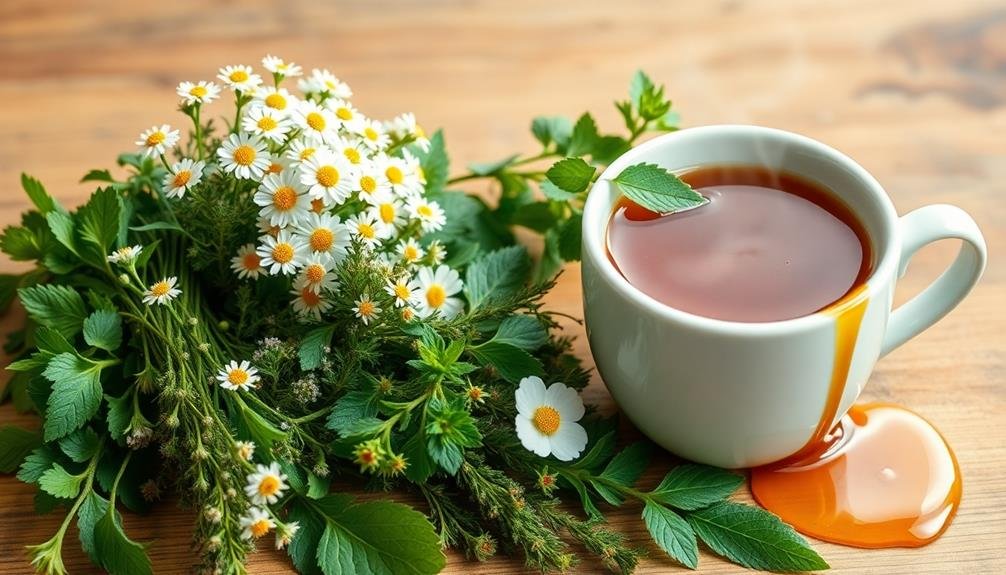
When you're dealing with a sore throat, several herbs can provide relief. One of the most popular options is chamomile. It's known for its soothing properties and can help reduce inflammation. You might want to sip on chamomile tea to ease discomfort and promote relaxation.
Another effective herb is slippery elm. Its mucilage content can coat your throat, providing a protective barrier and alleviating irritation. You can find slippery elm in various forms, including lozenges or powdered form for tea.
Throat-soothing properties are also found in licorice root. This herb has been used for centuries to treat sore throats due to its anti-inflammatory and soothing effects. Be cautious if you have high blood pressure, as licorice can affect blood pressure levels.
Lastly, consider using marshmallow root. Similar to slippery elm, it contains mucilage that can help relieve throat irritation. You can brew it as a tea or take it in capsule form.
Incorporating these herbs into your routine can help you find some relief and make your throat feel better.
Just remember to consult with a healthcare professional if you have any concerns about using herbal remedies.
Effective Blending Ratios
Finding the right blending ratios for herbal teas can greatly enhance their effectiveness for soothing sore throats. To create a balanced tea, consider starting with a base of chamomile or peppermint, as these herbs provide both soothing properties and flavor. A common ratio is one part chamomile or peppermint to two parts of your choice of throat-soothing herbs like marshmallow root or slippery elm. This way, you'll maintain a pleasant taste while boosting the tea's healing potential.
If you're adding stronger herbs, like licorice root, use them sparingly. A ratio of one part licorice to three parts milder herbs can help avoid overwhelming flavors.
Additionally, if you want to incorporate anti-inflammatory herbs like ginger or turmeric, a good starting point is one part ginger to four parts of the other blends.
Experiment with these ratios to find what works best for your palate and throat comfort. Keep in mind that everyone's taste preferences and sensitivities differ, so adjust the ratios as necessary.
Preparation Techniques for Blends
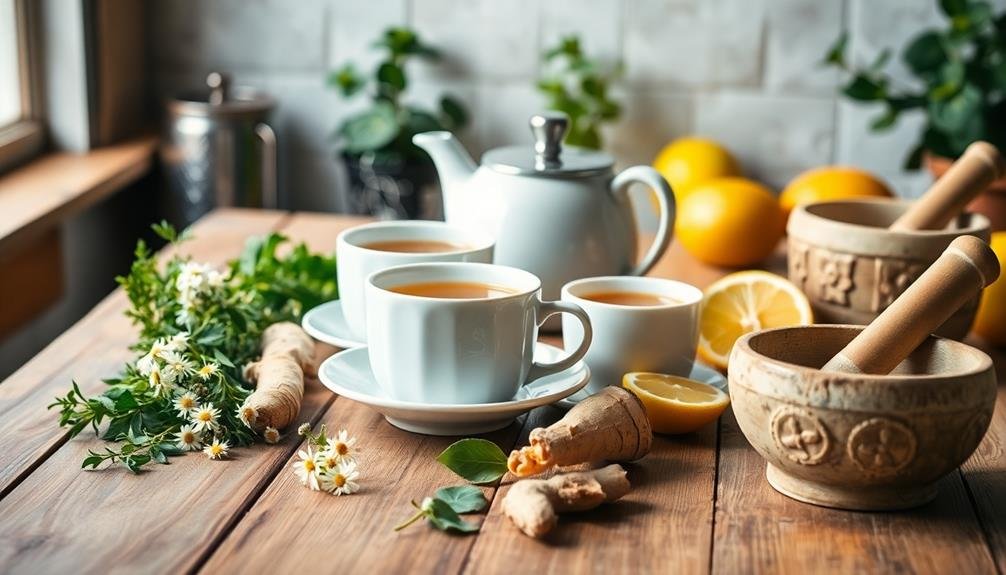
To brew the perfect herbal tea blend for a sore throat, start by boiling fresh, filtered water. Use a kettle or pot to heat the water until it reaches a rolling boil. This step is essential, as it helps to extract the beneficial properties of your herbs effectively.
While the water is heating, measure out the herbs according to your chosen blend. Common herbs for soothing sore throats include chamomile, licorice root, and slippery elm.
Once the water's boiling, remove it from heat and add your herbal mix. Cover the blend with a lid to trap the steam and essential oils, allowing the flavors and healing properties to infuse.
Let it steep for about 10 to 15 minutes. The longer the steeping time, the more robust the flavor and benefits.
After steeping, strain the tea into a cup, discarding the herbs. If you prefer a milder taste, feel free to dilute with hot water.
Enjoy your warm herbal tea blend slowly, allowing it to soothe your throat with each sip.
Flavor Enhancements to Consider
Enhancing your herbal tea blend can elevate its soothing effects and make the experience more enjoyable.
Consider adding honey, a natural sweetener known for its antimicrobial properties. Just a teaspoon can't only sweeten your tea but also provide a comforting texture that coats your throat.
Lemon juice is another excellent addition. Its vitamin C content can boost your immune system, and the acidity can help break down mucus. Combine it with honey for a deliciously tangy flavor that soothes your throat.
Spices like ginger and cinnamon can also work wonders. Ginger's anti-inflammatory properties can ease discomfort, while cinnamon adds warmth and depth to your blend.
Just a small piece of fresh ginger or a sprinkle of cinnamon can transform your tea.
Storing Your Herbal Blends
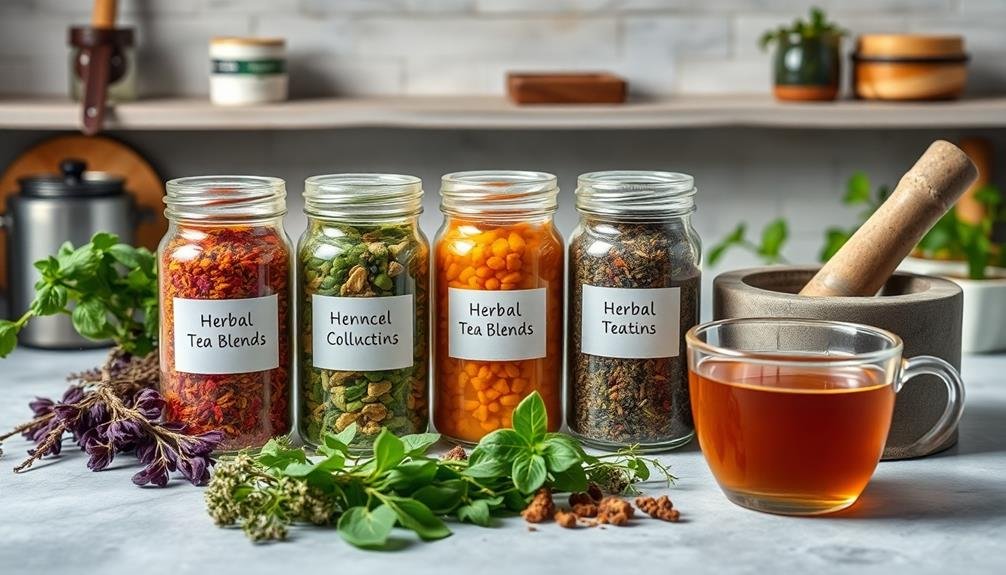
When it comes to storing your herbal blends, keeping them fresh is key to maintaining their flavor and potency. To achieve this, you should consider a few important factors: light, air, and moisture. Using airtight containers is essential for preserving your blends. Additionally, storing them in a cool, dark place will help prevent degradation.
Here's a quick reference table to help you remember the best practices for storing your herbal blends:
| Storage Method | Ideal Conditions | Duration of Freshness |
|---|---|---|
| Airtight Containers | Cool, dark area | 6 months to 1 year |
| Glass Jars | Away from sunlight | 1 year |
| Cloth Bags | Dry environment | 3 to 6 months |
Frequently Asked Questions
Can Children Safely Drink Herbal Teas for Sore Throats?
You can give children herbal teas for sore throats, but make sure they're age-appropriate and caffeine-free. Always check with a pediatrician first, as some herbs might not be suitable for younger ones.
Are There Any Side Effects of Herbal Teas for Sore Throats?
When using herbal teas for sore throats, you should consider potential side effects like allergic reactions, digestive issues, or interactions with medications. It's always smart to consult a healthcare professional before trying new remedies.
How Often Can I Drink Herbal Tea for Throat Relief?
You can drink herbal tea for throat relief several times a day, especially when you feel discomfort. Just listen to your body, and if you notice any adverse effects, reduce your intake accordingly.
Can Herbal Teas Replace Over-The-Counter Medications for Sore Throats?
Herbal teas can provide soothing relief for sore throats, but they shouldn't fully replace over-the-counter medications. They're great for comfort and hydration, but if symptoms persist, you should consider consulting a healthcare professional.
Which Herbal Teas Should I Avoid if I'm Pregnant?
If you're pregnant, you should avoid herbal teas like chamomile, licorice root, and pennyroyal. They may pose risks to your pregnancy. Always consult your healthcare provider before trying any new herbal remedies during this time.
In Summary
Incorporating herbal teas into your routine can be a soothing remedy for a sore throat. By choosing the right herbs, using effective blending ratios, and preparing your blends with care, you can create comforting drinks that provide relief. Don't forget to enhance the flavors to make your teas even more enjoyable. With proper storage, your herbal blends will be ready whenever you need them. Sip and savor your way to comfort the next time your throat feels rough!

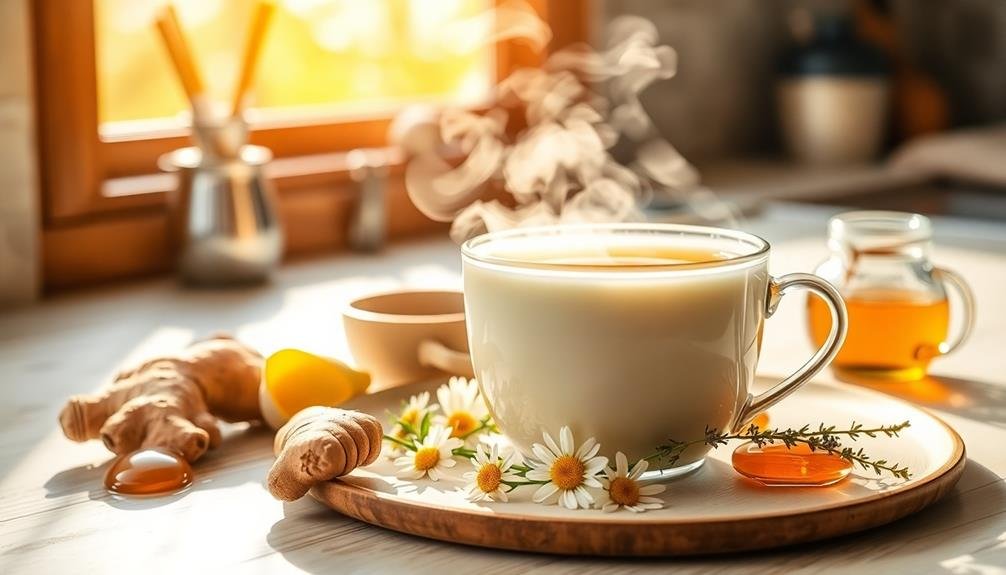
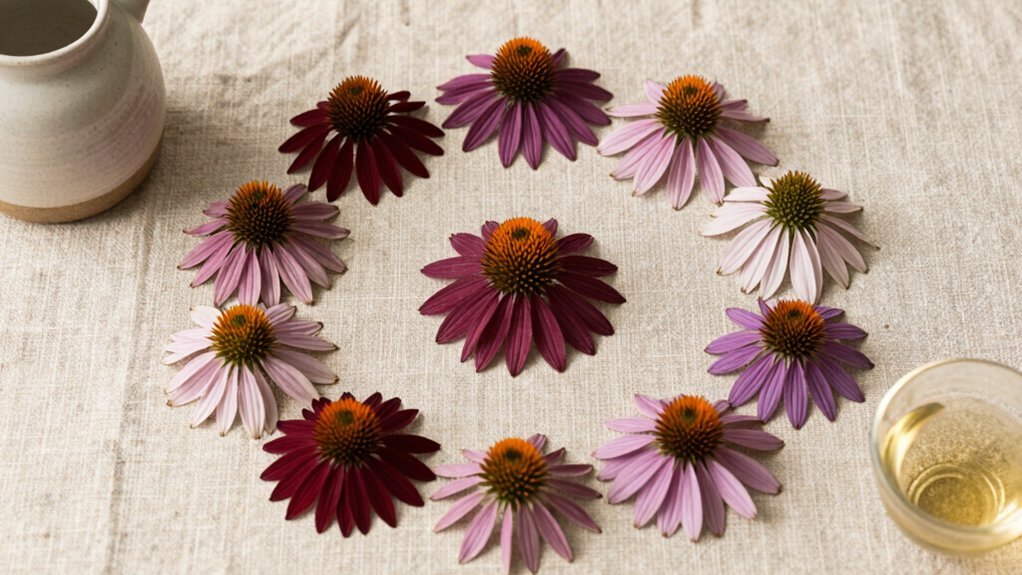
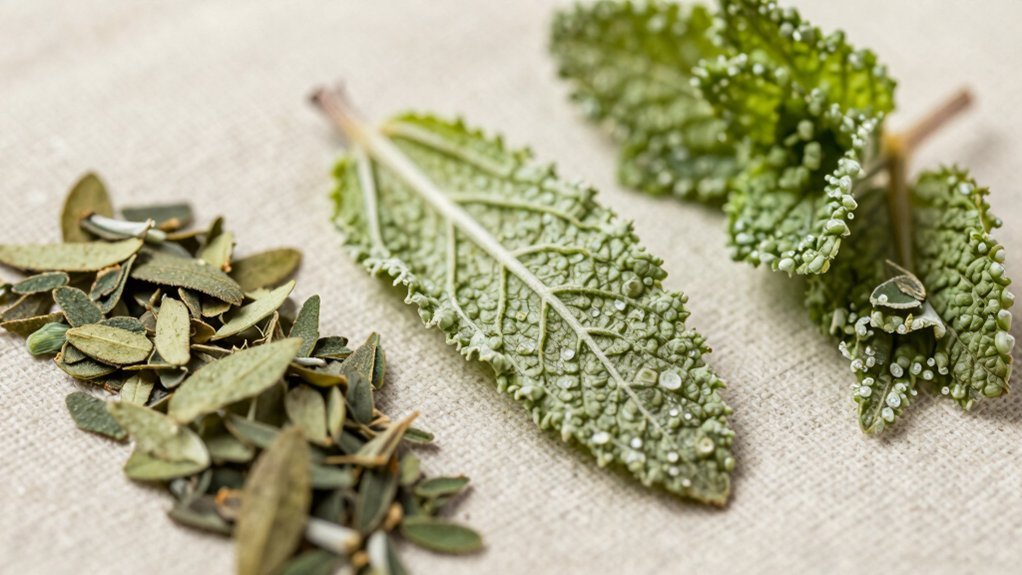

Leave a Reply